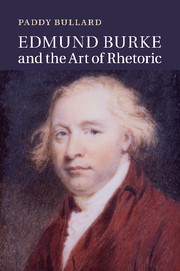Book contents
- Frontmatter
- Contents
- Acknowledgements
- Abbreviations
- Introduction: Burke, rhetoric and ethics
- 1 The ethical turn in early modern rhetoric, 1600–1760
- 2 Rhetoric in Ireland, 1693–1765
- 3 The Epicurean aesthetics of the Philosophical Enquiry
- 4 Episodes in the evolution of Burke's eloquence
- 5 Reflections on the Revolution in France and the rhetoric of character
- 6 Burke, Rousseau and the purchase of eloquence
- Conclusion
- Notes
- Bibliography
- Index
2 - Rhetoric in Ireland, 1693–1765
Published online by Cambridge University Press: 01 June 2011
- Frontmatter
- Contents
- Acknowledgements
- Abbreviations
- Introduction: Burke, rhetoric and ethics
- 1 The ethical turn in early modern rhetoric, 1600–1760
- 2 Rhetoric in Ireland, 1693–1765
- 3 The Epicurean aesthetics of the Philosophical Enquiry
- 4 Episodes in the evolution of Burke's eloquence
- 5 Reflections on the Revolution in France and the rhetoric of character
- 6 Burke, Rousseau and the purchase of eloquence
- Conclusion
- Notes
- Bibliography
- Index
Summary
Adam Smith is one of a generation of Scottish philosophers, critics and lecturers on rhetoric who create a new academic discipline during the mid eighteenth century: the study of literature in modern vernacular languages. The peculiarly Scottish character of this innovation has been much remarked upon, and the originality and influence of the Scottish belletrists – Smith, Hugh Blair, Lord Kames and George Campbell among them – is much admired. But there are several important respects in which the Irish, rather than the Scots, should be seen as the real pioneers of this new development in the art of rhetoric.
Historians of the rise of English studies sometimes notice that two Protestant Irish academics, John Lawson and Thomas Leland, published books on eloquence in 1758 and 1764, several years before Blair or Campbell sent their rhetorics to the press. Lawson and Leland were professors of oratory at Trinity College, Dublin, and their treatises are elaborations of their lectures. But these two important rhetoricians are dismissed as being neither engaged with the modern, practical applications of the oratorical arts, nor capable of the theoretical self-reflection with which Smith, Blair and company raise the ‘New Rhetoric’ into a new discipline. This unsatisfactory assessment does justice neither to the strengths of their published writings, nor to the local context of Lawson and Leland's work.
- Type
- Chapter
- Information
- Edmund Burke and the Art of Rhetoric , pp. 52 - 78Publisher: Cambridge University PressPrint publication year: 2011



